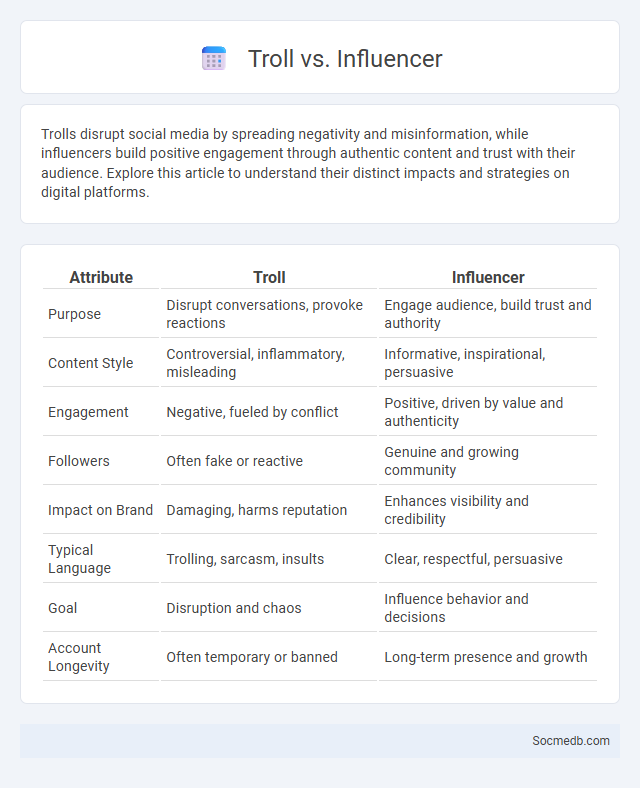
Photo illustration: Troll vs Influencer
Trolls disrupt social media by spreading negativity and misinformation, while influencers build positive engagement through authentic content and trust with their audience. Explore this article to understand their distinct impacts and strategies on digital platforms.
Table of Comparison
| Attribute | Troll | Influencer |
|---|---|---|
| Purpose | Disrupt conversations, provoke reactions | Engage audience, build trust and authority |
| Content Style | Controversial, inflammatory, misleading | Informative, inspirational, persuasive |
| Engagement | Negative, fueled by conflict | Positive, driven by value and authenticity |
| Followers | Often fake or reactive | Genuine and growing community |
| Impact on Brand | Damaging, harms reputation | Enhances visibility and credibility |
| Typical Language | Trolling, sarcasm, insults | Clear, respectful, persuasive |
| Goal | Disruption and chaos | Influence behavior and decisions |
| Account Longevity | Often temporary or banned | Long-term presence and growth |
Understanding the Rise of Trolls and Influencers
The rise of trolls and influencers on social media reflects shifting dynamics in online engagement, where trolls often provoke conflict to gain attention, while influencers build trust and drive consumer behavior through authentic content. Platforms like Instagram, TikTok, and Twitter have become battlegrounds for influence, with algorithms favoring sensational or relatable content that either fuels controversy or promotes personal branding. Understanding these behaviors helps you navigate social media more effectively, recognizing when to engage and when to disengage for a healthier digital experience.
Defining Trolls: Motivation and Methods
Trolls on social media are individuals who deliberately provoke, disrupt, or spread misinformation to elicit emotional responses and create chaos. Their motivation often stems from a desire for attention, power, or to influence public opinion through tactics such as fake accounts, inflammatory comments, and coordinated harassment campaigns. Understanding these methods helps you recognize and protect yourself from manipulative online behavior.
Who is an Influencer? Power and Impact
An influencer is a person with the ability to affect the purchasing decisions and behaviors of their audience through their authority, knowledge, or relationship with followers on social media platforms. Their power stems from high engagement rates, large follower counts, and trustworthiness, making them key players in digital marketing and brand promotion. Influencers impact trends, consumer attitudes, and brand visibility, driving significant economic value across industries from fashion to technology.
The Troll vs Influencer Dynamic: Key Differences
Understanding the key differences between trolls and influencers is crucial for navigating social media successfully. Trolls aim to provoke, spread negativity, and disrupt online communities, while influencers build trust by creating authentic content that engages and inspires their audience. Your ability to recognize these dynamics helps you foster positive interactions and avoid harmful online behaviors.
Types of Trolls: From Mischief to Malice
Social media hosts various types of trolls, ranging from mischievous pranksters who seek attention through harmless jokes to malicious actors aiming to disrupt communities via harassment and hate speech. Among these, griefers deliberately provoke anger, while concern trolls masquerade as allies to undermine discussions. Understanding these diverse troll behaviors aids in developing effective moderation strategies to maintain positive online interactions.
How Influencers Respond to Troll Behavior
Influencers respond to troll behavior by employing strategic communication techniques such as ignoring, blocking, or directly addressing negative comments to maintain their online reputation. They often leverage community guidelines and platform tools to report abusive content and protect their audience from harmful interactions. Effective responses balance assertiveness with professionalism, fostering a positive digital environment and reinforcing influencer credibility.
The Impact of Trolls on Digital Culture
Trolls disrupt digital culture by spreading misinformation, inciting conflicts, and creating toxic environments that hinder genuine online interactions. Their persistent negative behavior leads to decreased user engagement and challenges in maintaining constructive social media communities. Understanding how trolls manipulate conversations can empower you to navigate social platforms more safely and promote healthier digital interactions.
When Influencers Become Trolls: Blurred Boundaries
Influencers on social media platforms often blur the line between genuine engagement and trolling, impacting follower trust and brand reputation. The rise of controversial content from popular figures leads to increased polarization and online harassment, challenging platform moderation policies. This dual role complicates influencer marketing strategies, demanding more nuanced audience analysis and ethical guidelines.
Managing Troll Attacks: Strategies for Influencers
Influencers can manage troll attacks by implementing strict comment moderation tools and employing AI-driven filters to detect harmful language quickly. Engaging with their community through transparent communication fosters a positive environment, reducing the impact of negative comments. Collaborating with platform support teams ensures prompt action against persistent troll accounts, maintaining a safer online presence.
The Future of Trolls and Influencers Online
The future of trolls and influencers online will be shaped by advanced AI-powered moderation tools that enhance content filtering and reduce harmful interactions. Influencers will increasingly leverage augmented reality (AR) and virtual reality (VR) platforms to engage audiences in immersive experiences, transforming digital marketing strategies. Social media ecosystems will prioritize authentic engagement metrics and community-driven content to mitigate trolling behavior and promote positive interaction.
 socmedb.com
socmedb.com